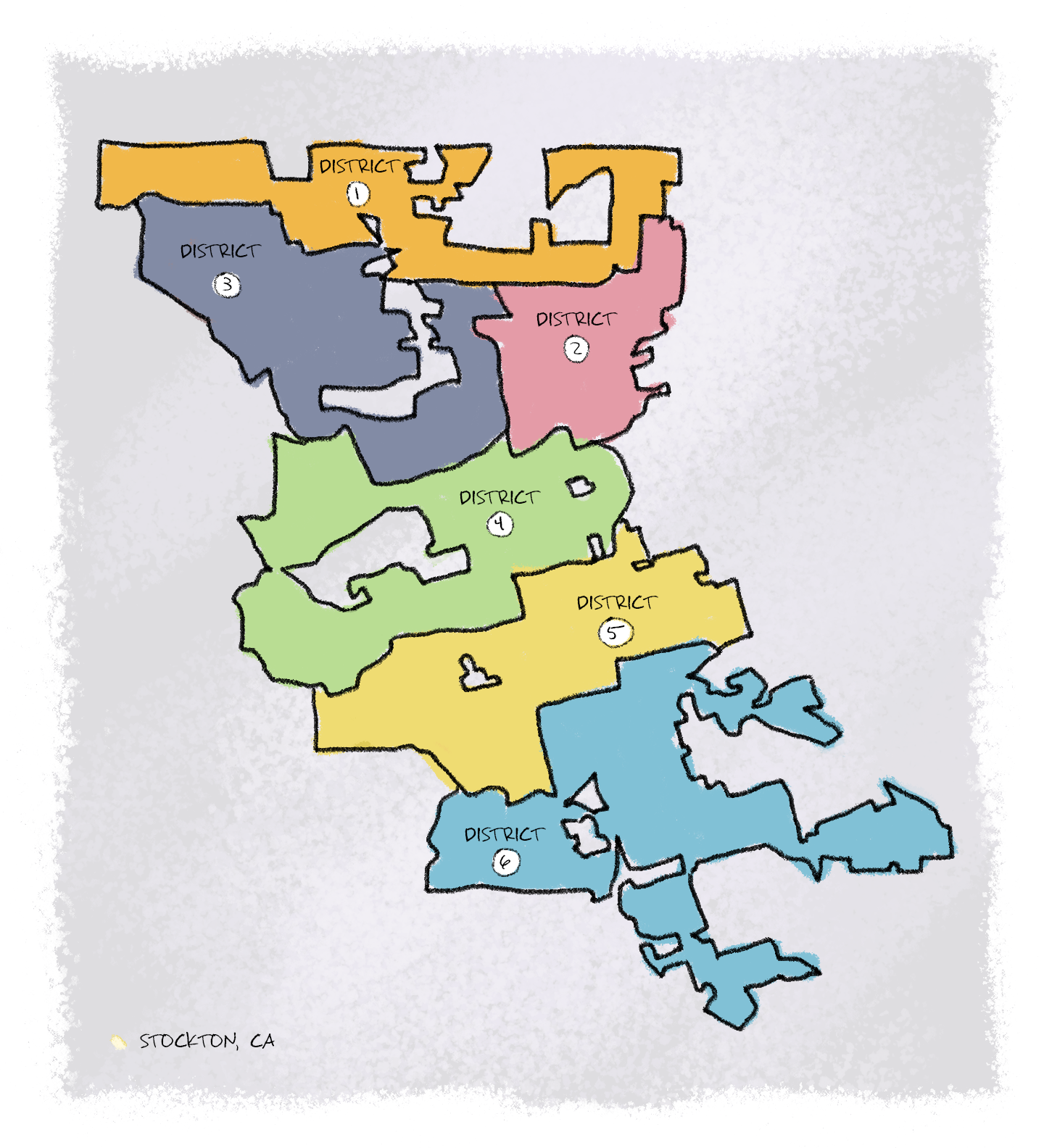Introduction
If you’re reading this guide, you’re probably figuring out how to best engage in Stockton local government. Local governments have immense power over your daily life — almost every facet of how you live, work, play, and travel. The policy implications in San Joaquin County impact more than 800,000 people, with our population growing every year.
Local government has the power to make real change on the issues you care about.
Stockton City Council Meeting
In some cases, federal legislation and resources can make a huge difference. But in others, like policing, transportation, and housing construction, much of the power is local. Together, we can transform local systems that are rooted in inequity.
All 816,108 people in the County are governed by the Board of Supervisors, where each one of the five members represent over 150,000 residents, alongside a popularly elected District Attorney, County Assessor, and Sheriff. San Joaquin County is widely known for its prime agricultural land, with agriculture and related businesses serving as some of the county's greatest economic assets.
The City of Stockton has six (6) Councilmembers who each represent more than 50,000 people each. The seventh member of the Council is the Mayor, who represents the entire city. Together, the Mayor and City Council represent everyone within Stockton’s city limits.
A similar dynamic exists across the seven (7) other cities in San Joaquin County, where relatively small portions of the population are able to set the agenda and advance their priorities through the power of law and government funding.
The process for public involvement limits constructive debate, and empowers well-connected and privileged insiders who have the time, resources, and skills to navigate these complex systems.
The Stockton Govguide is here to change that.
This guide is designed to help you understand how local government works, navigate these systems with confidence, and build the collective power needed to change them—using local government to transform Stockton into a better home for us all.
From the San Joaquin County Board of Supervisors to the Stockton City Council, the Stockton GovGuide explains how these systems function, how they are connected, and—most importantly—how you can get involved in making Stockton a fair and flourishing place for everyone.
Take the first step and read about the difference between County and City governments below.
County vs. Cities
What’s the difference between San Joaquin County and the City of Stockton and other municipal governments?
One of the most important things to understand about local government is the difference between county government and city government—because where you live determines who makes decisions, who controls resources, and where public input has the most impact.
San Joaquin County and the City of Stockton are two separate governments with different responsibilities, elected officials, and budgets. Even if you primarily interact with City departments, County decisions still shape many aspects of your daily life.
San Joaquin County
Map of San Joaquin County Districts
San Joaquin County is the largest local government in the region, serving more than 800,000 residents across seven incorporated cities and all unincorporated areas. The County is governed by a five-member Board of Supervisors, each elected by district and exercising both legislative and executive authority.
Unlike cities, the County:
Acts as the primary provider of health and human services
Oversees countywide systems that cross city boundaries
Serves as the local government for residents living outside city limits
Even if you mostly deal with your local city’s officials and departments, it’s crucial to remember that the County Board of Supervisors still have a HUGE influence on your life.
COUNTY DEPARTMENTS:
The Agricultural Commissioner enforces the provisions of the California Food and Agricultural Code for the protection of the public's health, safety and welfare, and to promote and protect the agricultural industry.
Assessor - Recorder - County Clerk maintains vital and public records and assesses all taxable property according to state laws and regulations.
Auditor Controller safeguards and conserves taxpayers dollars.
The Department of Child Support Services works with parents - custodial and noncustodial - and legally acknowledged guardians to ensure children and families receive court ordered financial and medical support.
Community Development Department building inspection, planning/development services, neighborhood preservation, GIS mapping.
Employment and Economic Development Department (SJC WorkNet) provides employment and training opportunities to job seekers in San Joaquin County by assisting them with accessing employment, education, training and support services required to succeed in the labor market. San Joaquin County WorkNet also supports our local Business community by assisting businesses in accessing the available resources and services that promote business growth and increase employment opportunities.
The Environmental Health Department deals with solid and hazardous waste, public health, food and restaurant inspections, housing abatement, sanitation, environmental impact reports, recreational health, etc.
The General Services Department has divisions that include facilities maintenance, property management, capital projects, and parks and recreation.
Health Care Services has departments that include Behavioral Health Services, Mental Health, Public Guardian/Conservator, Substance Abuse, Emergency Medical Services, Public Health Services, Veterans’ Services, and Neighborhood Preservation.
Human Services Agency programs include: California Work Opportunity and Responsibility to Kids (CalWORKs), Foster Care, CalFresh, General Assistance, Medi-Cal, Adoptions, Child Protective Services, Adult Protective Services, In-Home Supportive Services (IHSS), Refugee Assistance, and the Mary Graham Children’s Shelter.
The Office of Emergency Services is the key disaster preparedness office of the County, and has direct responsibility to support and coordinate the efforts of County departments carrying out their functions in the field. To ensure a coordinated response to their disaster needs, OES also provides disaster information, logistical support, facilitates mutual aid requests, and facilitates inter-jurisdictional coordination with agencies from 7 cities, 120 special districts, and locally-based State and Federal agencies.
The Parks and Recreation Department (SJC Parks) is responsible for the development and maintenance of all regional, community and neighborhood parks and facilities in San Joaquin County.
The Probation Department identifies candidates for probation, recommends sanctions to be imposed, designs supervision plans for probationers, operates juvenile hall, provides a Probation Camp for juveniles, etc.
The Department of Public Works services the county’s underground facilities, roadways, bridges, minor structures, solid waste facilities, project levees, channels, and special districts which provide water, sanitary sewer, storm drainage, and street lighting services.
The County’s responsibilities tend to focus on people-centered services and regional systems, including:
Public health, behavioral health, and substance use services
Social services such as Medi-Cal, CalFresh, CalWORKs, foster care, and adult protective services
Countywide elections and voter registration
Law enforcement through the Sheriff’s Office and operation of county jails
The District Attorney’s Office and criminal prosecution
Property assessment, tax administration, and public records
Emergency management and disaster coordination
The County also operates large systems—such as hospitals, clinics, and regional infrastructure—that individual cities may not be able to efficiently manage on their own.
For 2025-2026, the County adopted an annual budget of $3.0 billion.
Pro-Tip
Unincorporated towns are fully-fledged towns (or even small cities) that do not have their own local government. They tend to answer to the County, even though they do not have their own elected officials. As a result, they're bound by the County's laws. If you live in an unincorporated area, your County Supervisor is your most direct elected decision-maker for local issues.
All seven (7) cities within San Joaquin County, no matter how big or small, have power over housing and building, planning, zoning, and development. They manage how streets, parking, sidewalks, streetlights, and even local transportation departments function. Larger cities commonly have their own police, fire, parks, and library departments.
The City of Stockton
Map of City of Stockton Districts
Cities are smaller local governments that focus primarily on shaping the physical environment and delivering day-to-day municipal services. Each city has its own elected officials, departments, and policies.
The City of Stockton—the largest city in the County—operates under a City Charter with a council–manager form of government, where the Mayor and City Council set policy and a City Manager oversees daily operations.
Stockton is the heart of San Joaquin County, with a population of over 320,000 residents. It operates and is responsible for:
Police and fire services
Local streets, sidewalks, traffic signals, and streetlights
Parks, recreation, and libraries
Solid waste, sanitation, and municipal utilities
Housing policy, land use, zoning, and development approvals
Local planning and building permits
These responsibilities give cities significant influence over neighborhood conditions, housing availability, and economic development.
The More you know
In practice, many issues fall into a shared or overlapping space between cities and the County.
For example:
Homelessness: Cities typically manage shelter, housing development, and land use, while the County provides health, behavioral health, and social services. These efforts are coordinated through countywide governance structures involving multiple jurisdictions and service providers.
Public safety: Cities operate police departments, while the County Sheriff serves unincorporated areas and manages the county jail.
Public health emergencies: The County leads public health response, while cities implement local actions.
This overlap is why the answer to “Who’s responsible?” is often: it depends.
The Stockton Metropolitan Airport is operated by the County government.
The Port of Stockton is governed by a seven-member Board of Commissioners; four commissioners are appointed by the City of Stockton and three commissioners appointed by San Joaquin County. The Board establishes policies under which the Port's staff, supervised by the Port Director, conducts its daily operations.
Build Community Knowledge + Power
You don’t need to be an expert, a policy wonk, or a lifelong activist to use this guide.
The Stockton GovGuide is designed for everyday people who want to understand how local government works—and how to make it work better for their communities. You can read it straight through, jump to the sections that matter most to you, or return to it as a reference when questions come up.
This guide is not about memorizing facts. It’s about learning where decisions are made, who holds power, and how everyday people can influence outcomes.
As you read, you may notice that local government can feel complicated, inaccessible, or even frustrating by design. If that resonates, you’re not alone. These systems were not built to be easy to navigate—and feeling overwhelmed is not a personal failure. It’s a common starting point.
One of the most important skills this guide builds is learning whether an issue falls under County or City authority. Knowing this helps you:
Contact the right elected officials
Show up at the right meetings
Focus your advocacy where decisions are actually made
Avoid frustration caused by being redirected between agencies
Understanding which level of government holds decision-making power is one of the most effective ways to make your participation count.
Choose Your Starting Point
Use this guide in the way that best fits where you are right now:
If you’re brand new to local government:
Start with County vs. City Government to understand who does what—and who to contact.If you care about a specific issue or decision:
Jump to The Policymaking Process and Understanding the Connections to see where and when public input matters most.If you want to speak up or take action:
Go to Civic Participation at Your Local Government for practical guidance on meetings, public comment, and engagement.If you want to build long-term influence:
Explore Committees and Commissions and Running for Office to learn how power is shaped over time.
There is no “right” order. The best place to begin is wherever your curiosity, concern, or urgency is strongest.
A Note on Power and Participation
Throughout this guide, we talk openly about power—who has it, how it’s exercised, and how it can be challenged or shared more fairly. This is intentional. Understanding power helps explain why some voices are heard more than others and why participation can feel uneven or discouraging.
Learning how local government works is a form of civic power. Using that knowledge—together with others—is how change happens.
Take this guide at your own pace. You belong in these conversations, and your participation matters.
With that said, ask questions! The best way to gain knowledge is to consult with community advocates to get their insights.
You can also reach out to your local representatives at both the city and county level.
The more time you invest in advocating for your values and interests, the more you’ll learn about how government works, how power works, and how you can be effective. You just need to take the plunge!
Start learning about San Joaquin County Government by reading onwards.





